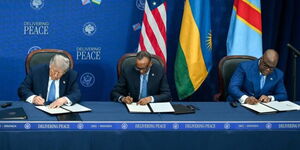The prevailing drought situation in the country is threatening lives of thousands of people even as the government moves in to address the crisis.
Kenyans living in arid and semi-arid areas, especially in the larger Northern Frontier District (NFD) and parts of the Rift Valley, are the most affected by the ravaging drought having to go for weeks without water and food, with others being forced to cover hundreds of kilometres in search of the precious commodities.
It is this situation that has rattled the leaders of the affected areas over what they term as the national government's non-committal attitude to resolve the problem.
The leaders from these areas are now calling for the postponement of the August 9, 2022 polls, asking the government to channel those resources to addressing the current crisis and save millions of lives that are under threat.
One of the leaders pressuring the government to move with speed and address the situation is the Tharaka Nithi Governor, Muthomi Njuki, who spoke on Friday, November 26.
The Governor called on the government to turn its eyes off the 2022 elections and focus on saving people from dying of hunger. He said that the government had paid too much attention to the election while turning a deaf ear on citizens who were desperately calling on authorities to help them access water and food.
The Governor further called for the postponement of next year’s elections and the billions of shillings set for the polls be diverted to mitigate the dire situation.
"The government now needs to think about what is priority. The elections can wait, but hunger cannot," stated Muthomi.
"The billions that have been set aside can be used to urgently mitigate the situation at hand before it escalates further."
The sentiments by Governor Njuki followed just a week after leaders drawn from North Eastern region shelved their political differences in a sober gesture to pressure the government address the drought situation.
Led by former National Assembly Majority Leader, Aden Duale, and Eldas Member of Parliament, Adan Keynan, the leaders claimed that the residents were on the verge of succumbing to hunger if the government did not move with speed to distribute relief food.
“We are telling the government that the situation is dire, the rains have failed and the (weather) forecast is not very good. Going forward the same counties will face depressed rainfall,” stated Duale.
The Situation at a Glance
Areas that have been hit the hardest by the raging drought include North Eastern, upper and lower eastern, North Rift and parts of Coast.
Some parts of Meru and Tharaka Nithi counties that have previously reported moderate drought crisis, have reported water and food inadequacy, forcing them to outsource the resources in the neighboring areas.
In Isiolo County, media reports indicate that more than 60 per cent of the residents are in critical need of food supplies, as they risk starvation should the drought menace last any longer.
Counties such as Marsabit, Wajir, Samburu, Mandera, and Turkana are also in the red zone with very minimal to almost no access to drinking water, food and pasture for their livestock.
The areas have reported huge losses following the starvation of their animals.
The consequences of the drought in most pastoralist communities is the unending clashes as people drive away their animals in search of pastures, forcing them to invade other people's territories.












